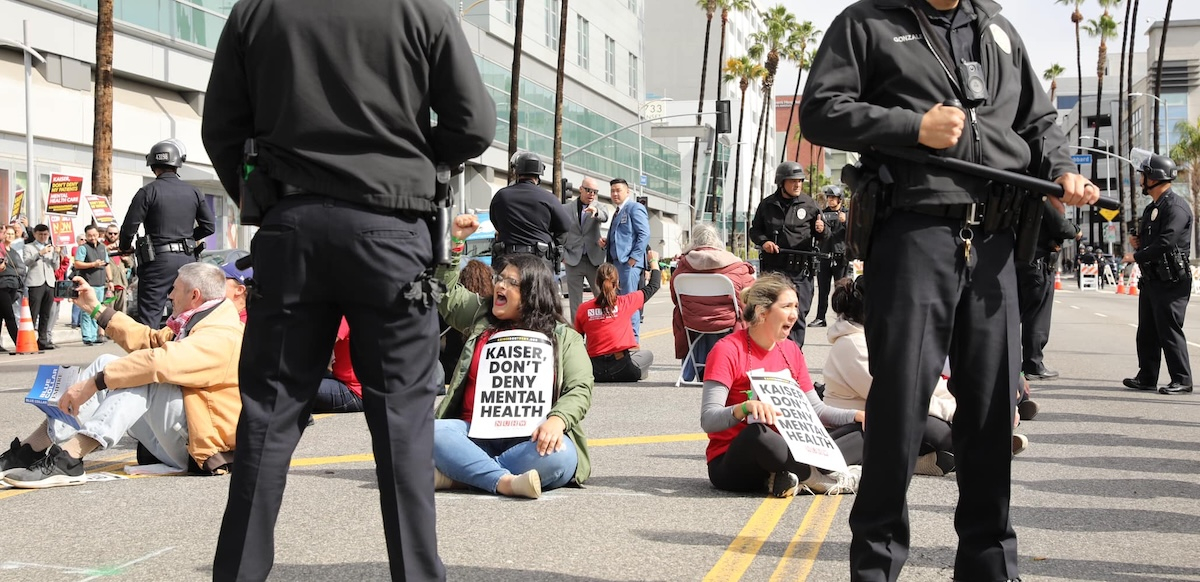Southern California Kaiser Strikers Stay Out for Parity

Kaiser strikers blocked Sunset Boulevard in Los Angeles on February 7, blocking traffic in front of Kaiser Permanente’s Los Angeles Medical Center. A dozen were arrested. The health workers have been on strike for nearly four months. Photo: NUHW.
On day 110 of their strike, behavioral health care workers in Southern California sat down in the middle of Sunset Boulevard in Los Angeles, blocking traffic in front of Kaiser Permanente’s Los Angeles Medical Center. The 2,400 striking workers are members of the National Union of Healthcare Workers (NUHW), and include psychologists, social workers, psychiatric nurses, addiction medicine counselors, and family therapists.
A dozen strikers were arrested in the February 7 action, along with labor leaders, including California Labor Federation President Lorena Gonzalez. They are fighting for parity with Kaiser’s workers in Northern California, who won significant gains in a 10-week strike in 2022.
The Southern California workers, who are picketing workplaces from Bakersfield to San Diego, want their patients to have timely visits. Patients currently endure waits of four weeks or longer for return appointments and treatment. This is true even though California mandates a maximum wait time of 10 business days for both initial and return visits.
The workers also want time to do their jobs providing mental health care. They want seven hours per week to prepare for appointments, devise treatment plans, provide resources, file mandated reports, and go to the bathroom, said medical social worker Adriana Webb in Los Angeles.
Kaiser is the largest HMO in the country with profits of $4.1 billion in 2023 and $64 billion in the bank. It provides services for 4.8 million enrolled members in Southern California. But it has been cancelling thousands of appointments rather than meet the strikers’ demands, which come in the middle of a national crisis in mental health.
The company’s intransigence affects a huge swath of the labor movement in Southern California, since thousands of Kaiser’s patients are union members. In addition to support from the Los Angeles Federation of Labor, an array of elected officials have called out the giant HMO for having shown no urgency in reaching an agreement, including California’s Assembly Speaker Robert Rivas and Senate President Pro Tempore Mike McGuire. They urged Kaiser to “resume good faith negotiations with NUHW as soon as possible, and to agree to the union’s reasonable contract proposals in order to ensure the delivery of timely and appropriate behavioral health services to your patients.”

SUPPORT LABOR NOTES
BECOME A MONTHLY DONOR
Give $10 a month or more and get our "Fight the Boss, Build the Union" T-shirt.
California’s governor, Gavin Newsom, urged action in the wake of the wildfires. In a February 6 letter to Kaiser and the union, he wrote, “Getting our full behavioral health workforce back to work gives us the best chance to address the needs that will undoubtedly grow in the weeks and months to come,” noting that due to devastating wildfires “thousands of Californians are grappling with extreme loss and displacement.” He offered to assist in “identifying a mutually agreed-upon mediator.” Kaiser hasn’t yet responded to Newsom’s offer of mediation.
Instead, Kaiser executive Dawn Gillam has doubled down on maintaining the disparity between Kaiser’s northern and southern mental health systems, insisting “we are two different business models… and we have two different geographic markets that are very different.”
Kaiser’s slow-motion bargaining is set to resume today, but it will not schedule another session until March 6. After nearly four months on strike, 82 percent of workers signed a petition committing to strike as long as it takes.
Go to NUHW.org to send messages of support and make contributions to the hardship fund.
Cal Winslow’s latest book is Radical Seattle, the General Strike of 1919.





